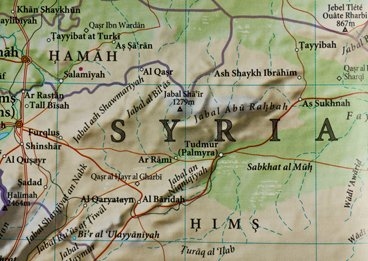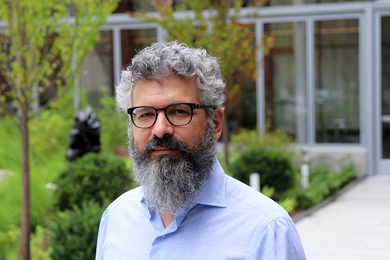This week has produced an important development concerning the situation in Syria: The United States, which has been weighing a potential military strike against government forces in the Syrian civil war, now seems open to the possibility of a Russian-backed intervention aimed at removing Syria’s stockpiles of chemical weapons.
That shift may have been driven by reflection upon the profound uncertainties that would accompany any military action at this point, a group of foreign-policy and weapons experts said Wednesday at a public forum at MIT.
Those uncertainties include the circumstances in which chemical weapons appear to have been used in Syria’s civil war — especially in an Aug. 21 attack that left many Syrians dead — as well as the unknown composition of any new government in Syria, should the current one be forced out.
Barry Posen, the Ford International Professor of Political Science at MIT and director of MIT’s Security Studies Program, noted that it was still unclear, even to many in Congress, exactly who may have used chemical weapons in the recent attack, and why.
“It’s a very strange and difficult war, and there are a number of ways an event like this could have occurred,” Posen told an audience of more than 200 people in MIT’s Bartos Theater. Wednesday’s event was part of the Starr Forum, a series of discussions hosted by MIT’s Center for International Studies.
The chemical-weapons attack could even have been some kind of mistaken order in the fog of war, Posen suggested — which would not diminish the need to prevent further such attacks, he added, but might help shape the response of lawmakers being asked to vote on a war resolution.
The Aug. 21 incident has heightened calls for the United States to intervene militarily against the Syrian government and its longtime leader, Bashar al-Assad. More broadly, Posen suggested, the dispute over what course of action the United States should take, if any, reflects an ongoing divide among America’s leaders.
“There has been a dispute in the American foreign-policy community writ large, and in the highest reaches of the Obama administration itself, about the entire Syrian civil war,” Posen said. Some key foreign-policy advisers, he noted, favor a more aggressive policy of intervention, often as part of a larger strategy of using American force to reshape geopolitics. But Obama’s own remarks, Posen suggested, have provided “lots of evidence” that the president himself has reservations about this approach.
Moreover, Posen conceded, policymakers may have been caught off-guard by polls showing significant public wariness about a military action in Syria. Those favoring military action, Posen said, “seem to have been … astonished to find out they ran into significant resistance in populations across the Western world.”
What would come next?
Augustus Richard Norton, a professor of international relations at Boston University who specializes in Middle East policy, sounded a skeptical note about the form a new Syrian government would take if Assad were to be removed from office.
“I’m not a pacifist,” Norton said. “But my premise for any use of national power is that we should have a very good idea what we’re trying to accomplish with that power. And I think the Syrian case is particularly vexing in that regard.”
Even Lebanon’s civil war, which lasted from 1975 to 1990 and was a “horrendous experience” for citizens of that country, Norton said, offered a simpler path to resolution.
“It was easier to end the Lebanese civil war than it’s likely to be to end the Syrian civil war,” Norton said, noting that many state institutions kept functioning during Lebanon’s war. Also, he said, the Lebanese peace settlement used a principle of “no victor, no vanquished,” which is unlikely to be applied in Syria.
Syria’s porous borders, masses of refugees, and unstable groups of rebels, Norton added, all beg the question: “What is the ability of the U.S. in this kind of fluid situation, in which politics are in many ways inchoate, particularly among the opposition?”
How feasible is disarmament?
However, attempting to remove chemical weapons from Syria could prove problematic, said Jeanne Guillemin, a senior advisor to the Center for International Studies and a scholar who has written extensively on bioweapons.
The current international treaty banning chemical weapons, written in the 1990s and subsequently signed by 188 countries — but not Syria — created a key role for an independent, international group, the Organization for the Prohibition of Chemical Weapons, to oversee the process of disarmament.
That mechanism places the financial and logistical “burden” on states to pay for inspectors and ensure their safety, Guillemin noted. Leaving aside the fact that Syria did not sign the treaty, implementing that standard process would be difficult simply because of security concerns during the civil war.
“The safety of the inspectors has to be assured when they go in to any environment,” Guillemin said. “These are not people trained for warfare.”
That means, she suggested, that in order for the weapons stockpiles to be destroyed, “there would have to be some sort of cease-fire” — a goal that has proven elusive since the current civil war began in spring 2011.
For the record, Guillemin said, she supports some kind of negotiated resolution to the problem, and hopes the Syrian crisis will lead to renewed enforcement of weapons bans of all kinds.
“I know these are very utopian ideas and ideals, but I think they are very important, and when we forget arms control, or we put it on the back burner, or we don’t fund it, then we get situations like the crisis we’re in today,” Guillemin said.
Norton sounded an additional note of caution about a potential military intervention: It might not prove effective against Assad’s forces, potentially leading to deeper American involvement in the situation.
“There’s always the risk that upon the application of force, we don’t accomplish very much,” Norton said. In that case, he added, “The government that the U.S. would like to see transitioned out of power remains in power, [leading to] a strong temptation to up the ante.”
That shift may have been driven by reflection upon the profound uncertainties that would accompany any military action at this point, a group of foreign-policy and weapons experts said Wednesday at a public forum at MIT.
Those uncertainties include the circumstances in which chemical weapons appear to have been used in Syria’s civil war — especially in an Aug. 21 attack that left many Syrians dead — as well as the unknown composition of any new government in Syria, should the current one be forced out.
Barry Posen, the Ford International Professor of Political Science at MIT and director of MIT’s Security Studies Program, noted that it was still unclear, even to many in Congress, exactly who may have used chemical weapons in the recent attack, and why.
“It’s a very strange and difficult war, and there are a number of ways an event like this could have occurred,” Posen told an audience of more than 200 people in MIT’s Bartos Theater. Wednesday’s event was part of the Starr Forum, a series of discussions hosted by MIT’s Center for International Studies.
The chemical-weapons attack could even have been some kind of mistaken order in the fog of war, Posen suggested — which would not diminish the need to prevent further such attacks, he added, but might help shape the response of lawmakers being asked to vote on a war resolution.
The Aug. 21 incident has heightened calls for the United States to intervene militarily against the Syrian government and its longtime leader, Bashar al-Assad. More broadly, Posen suggested, the dispute over what course of action the United States should take, if any, reflects an ongoing divide among America’s leaders.
“There has been a dispute in the American foreign-policy community writ large, and in the highest reaches of the Obama administration itself, about the entire Syrian civil war,” Posen said. Some key foreign-policy advisers, he noted, favor a more aggressive policy of intervention, often as part of a larger strategy of using American force to reshape geopolitics. But Obama’s own remarks, Posen suggested, have provided “lots of evidence” that the president himself has reservations about this approach.
Moreover, Posen conceded, policymakers may have been caught off-guard by polls showing significant public wariness about a military action in Syria. Those favoring military action, Posen said, “seem to have been … astonished to find out they ran into significant resistance in populations across the Western world.”
What would come next?
Augustus Richard Norton, a professor of international relations at Boston University who specializes in Middle East policy, sounded a skeptical note about the form a new Syrian government would take if Assad were to be removed from office.
“I’m not a pacifist,” Norton said. “But my premise for any use of national power is that we should have a very good idea what we’re trying to accomplish with that power. And I think the Syrian case is particularly vexing in that regard.”
Even Lebanon’s civil war, which lasted from 1975 to 1990 and was a “horrendous experience” for citizens of that country, Norton said, offered a simpler path to resolution.
“It was easier to end the Lebanese civil war than it’s likely to be to end the Syrian civil war,” Norton said, noting that many state institutions kept functioning during Lebanon’s war. Also, he said, the Lebanese peace settlement used a principle of “no victor, no vanquished,” which is unlikely to be applied in Syria.
Syria’s porous borders, masses of refugees, and unstable groups of rebels, Norton added, all beg the question: “What is the ability of the U.S. in this kind of fluid situation, in which politics are in many ways inchoate, particularly among the opposition?”
How feasible is disarmament?
However, attempting to remove chemical weapons from Syria could prove problematic, said Jeanne Guillemin, a senior advisor to the Center for International Studies and a scholar who has written extensively on bioweapons.
The current international treaty banning chemical weapons, written in the 1990s and subsequently signed by 188 countries — but not Syria — created a key role for an independent, international group, the Organization for the Prohibition of Chemical Weapons, to oversee the process of disarmament.
That mechanism places the financial and logistical “burden” on states to pay for inspectors and ensure their safety, Guillemin noted. Leaving aside the fact that Syria did not sign the treaty, implementing that standard process would be difficult simply because of security concerns during the civil war.
“The safety of the inspectors has to be assured when they go in to any environment,” Guillemin said. “These are not people trained for warfare.”
That means, she suggested, that in order for the weapons stockpiles to be destroyed, “there would have to be some sort of cease-fire” — a goal that has proven elusive since the current civil war began in spring 2011.
For the record, Guillemin said, she supports some kind of negotiated resolution to the problem, and hopes the Syrian crisis will lead to renewed enforcement of weapons bans of all kinds.
“I know these are very utopian ideas and ideals, but I think they are very important, and when we forget arms control, or we put it on the back burner, or we don’t fund it, then we get situations like the crisis we’re in today,” Guillemin said.
Norton sounded an additional note of caution about a potential military intervention: It might not prove effective against Assad’s forces, potentially leading to deeper American involvement in the situation.
“There’s always the risk that upon the application of force, we don’t accomplish very much,” Norton said. In that case, he added, “The government that the U.S. would like to see transitioned out of power remains in power, [leading to] a strong temptation to up the ante.”






